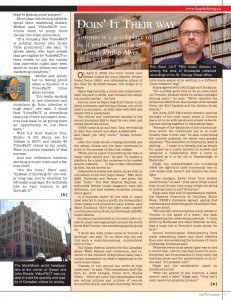Doin’ It Their Way
Toronto is a good place to be if you’re an indie artist or band. Philip Alves takes a closer look.
On April 6, 2003, the Corel Centre near Ottawa hosted the Juno Awards. Broken Social Scene (BSS) won Alternative Album of the Year for its 2002 release, You Forgot It In People.
Paper Bag Records, a small and independent label founded in 2002, had released the album six months earlier – its first.
But the crew at Paper Bag didn’t know much about contracts, said Enrique Soissa, one of the label’s co-founders, so their deal with BSS was sealed with a handshake.
The critical and commercial success of the record prompted BSS to start its own label just weeks before the Junos.
“(BSS) came at us and said, ‘Hey, we’re going to take this record and start Arts&Crafts … and thank you very much,'” Soissa remembered.
After the initial shock of losing both BSS and the album, Soissa and his team continued to build on the success of that first release.
“When you’re a part of something like that, it really helps launch you,” he said. “It creates a platform for a label like ourselves to be created almost instantly … It was a little bittersweet at first, but we moved on.”
Independent artists and labels, those with no connection to the four major labels – EMI, Sony BMG, Universal and Warner – are given the label “indie.” The New Musical Express, an influential British music magazine, uses this definition, one that notably mentions nothing about genre.
In a business where 80 per cent of major label acts fail to make a profit, the independent route makes a lot of sense to many artists, says Mary Zondanos. She’s the indie music market co-ordinator at the North by Northeast (NXNE) music festival.
Zondanos has travelled in Toronto’s indie circles for years and says people around the world know that Toronto has something special going on.
“I think the indie music scene in Toronto is thriving,” she said. “In no other city can you find such a multi-dimensional, multicultural kind of vibe.”
Phil Klygo, festival director for the Canadian Music Week festival and conference, and co-owner of the weewerk independent label, has a unique perspective on what’s happening in the indie music scene.
“Canada is cool around the world at that indie level,” he said. “The mainstream stuff like Sum 41, Avril Lavigne, Celine Dion, Shania Twain – there are some big heavyweights that are selling millions and millions of records around the world, and that’s one thing. But the indie scene seems to be exciting in a different (more creative) way.”
Soissa agreed with both Klygo and Zondanos.
“It’s a pretty good time to be an indie band (in Toronto) because there’s a certain spotlight shining down,” he said. “We’ve received the reciprocal effect from the success of the Arcade Fires, the Wolf Parades and the Broken Social Scenes.”
Ron Burd, CIUT FM’s music director, said the strength of the indie music scene in Toronto has a lot to do with bands and artists networking and coming together in interesting ways.
“Because of the dynamics of the communications world, the community per se is much broader than it ever was,” he said, underlining the current potential for easier and greater exposure. “The definition of community itself is shifting … I mean it is literally just as simple for myself as a music director to contact and establish a relationship with a band in Auckland as it is for me in Scarborough or Etobicoke.”
Klygo, too, acknowledged the incubating effect the tight-knit indie community has on new bands that haven’t yet enjoyed the limelight.
“Case example, Kevin Drew from Broken Social Scene,” he said. “If he name drops a band that no one knows, how many people are going to fucking check it out? Everyone.”
Klygo said that sort of spontaneous marketing happens frequently at Canadian Music Week. NXNE’s Zondanos agreed, saying that marketing and networking are what these festivals are about.
“We host 450, and sometimes more, artists in Toronto in the space of a week,” she said, emphasizing the networking potential. “I think North by Northeast and other festivals, as well, play a huge role in Toronto’s music scene, for sure.”
Recent technological developments have made networking easier and more effective than ever, democratizing the business of music publishing, Zondanos said.
“Whereas every indie artist’s goal was to find a record deal, now it’s like they know it’s something they can do themselves (if they have) the business sense and the perseverance to do it,” she said. “It’s possible now.”
Klygo put the exclamation mark on Zondanos’s point.
“With the advent of the Internet, a band doesn’t need a label,” Klygo said. “They don’t even need even physical product.”
kapiTal Magazine December, 2006 Page: 7 Byline: Philip Alves www.kapitalmag.ca
